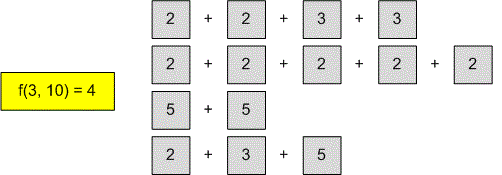Розбір
Let denote the number of ways to make the sum using the first denominations of coins. This number is equal to the sum of two quantities:
the number of ways to make the sum using the first denominations (i.e., without using the -th denomination), and
the number of ways to make the sum using all denominations.
Thus, we have the following relationship:
Initially, we set for .
Example
Let's consider the second example. Here, the sum and there are denominations. The last denomination has a value of . According to the relationship, we have:
The sum of can be made using the first three denominations in ways:

The sum of can be made using all four denominations in way:

Algorithm realization
Declare the arrays.
long long dp[51][251]; int a[51];
The value of will be stored in .
long long f(int k, int n)
{
if (k == 0 && n == 0) return 1;
if (k == 0 || n < 0) return 0;
if (dp[k][n] != -1) return dp[k][n];
return dp[k][n] = f(k - 1, n) + f(k, n - a[k]);
}The main part of the program. Read the input data.
memset(dp, -1, sizeof(dp));
scanf("%d %d", &n, &m);
for (i = 1; i <= m; i++)
scanf("%d", &a[i]);Print the required number of ways.
printf("%lld\n", f(m, n));Python realization
The value of will be stored in .
def f(k, n):
if k == 0 and n == 0:
return 1
if k == 0 or n < 0:
return 0
if dp[k][n] != -1:
return dp[k][n]
dp[k][n] = f(k - 1, n) + f(k, n - a[k])
return dp[k][n]The main part of the program. Read the input data.
n, m = map(int, input().split()) a = [0] + list(map(int, input().split())) dp = [[-1 for _ in range(n + 1)] for _ in range(m + 1)]
Print the required number of ways.
print(f(m, n))